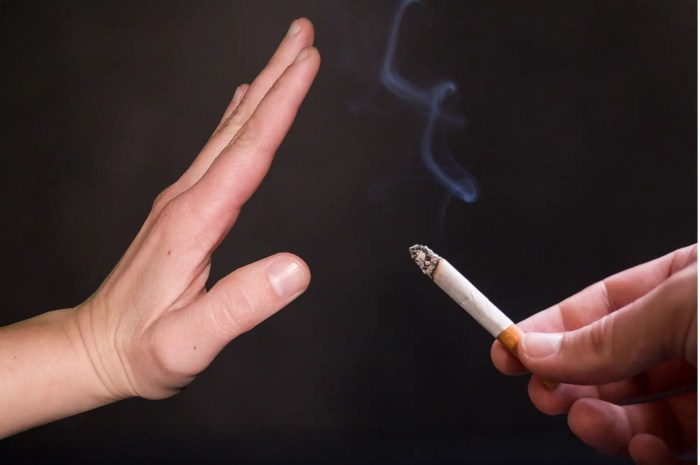Can Cannabis Treat Nicotine Addiction?
NOTE: While use of marijuana (or alcohol) isn’t forbidden for quitters who are posting roll on KillTheCan, they can, especially early in your quit, make you weak and make you make some poor decisions. Tread lightly.

The stigma associated with the use of cannabis is slowly changing as people learn about the various medical benefits of this plant. Formerly, cannabis use was widely considered substance abuse. However, research shows that the plant or some compounds it contains may be useful in addressing addictions. One area of interest is nicotine addiction. According to UCSF Health, one out of every five deaths in the United States is due to tobacco intake.
Another study also revealed that cigarette smoking is the number one reason behind premature deaths. Despite the staggering number of tobacco-related health issues, it’s nicotine dependence and addiction that’s of the greatest concern. That’s mainly because of the severe impacts it has on society. Luckily, natural treatments offer respite from the challenges that come with nicotine dependence and can help you beat addiction.
This article will answer the question: Can cannabis help you overcome addiction and nicotine dependence.
What You Should Know About Nicotine Dependence

The primary cause for nicotine dependence is the consumption of tobacco, mainly through smoking. Nicotine is a naturally occurring compound found in several plants. But it is also produced synthetically in products like cigarettes. In this form, nicotine can be highly addictive. You are nicotine dependent when you realize you can’t voluntarily quit consuming nicotine products, irrespective of the severe health implications.
The compound produces psychoactive effects similar to the high induced by THC in cannabis. Hence, some people believe cannabis growers and budtenders are more prone to nicotine addiction. However, just because someone knows when to harvest cannabis or uses it doesn’t mean they also use nicotine-rich tobacco.
What Do Studies Say?
According to recent research, it was observed that there are other ingredients apart from nicotine contained in cigarette smoke that causes addiction. Reports from the same research also stated that cigarettes deliver nicotine to the brain rapidly and contain special additives designed to make them highly addictive.
Since nicotine’s absorption rate is so high and has easy access to the brain, it usually delivers an intense ‘rush’ upon consumption. These effects add to the potency of the drug and enhance its addictiveness. And this also paves the way for the withdrawal symptoms.
Withdrawal Symptoms and Their Treatments

The research to understand the full scope of influence nicotine has on the human brain, organ systems, and functions has continued for many years. Although scientists are still discovering new facts, one thing is sure, nicotine addiction and dependence can have detrimental impacts on your psychological, physical, and mental wellbeing. Nicotine dependency can translate into behavioral changes, emotional imbalance, and many more.
This forms a vicious cycle where the behavioral changes caused by tobacco consumption become triggers that induce the craving for more tobacco. Ultimately, you’ll need to know the triggers that cause tobacco cravings in users before you can effectively treat nicotine addiction.
Treatments
Treating nicotine addiction can be a long and arduous journey. Stats show that only about three percent of tobacco users complete this journey. There are several withdrawal symptoms along the way, including isolation, irritability, mood swings, depression, and anxiety. At present, there are numerous treatments you can use to subdue these symptoms. Some of them include yoga, cognitive retraining, essential oils and herbs, acupuncture, the list goes on.
However, you’ll need to be ready to make some much-needed personal changes to your daily routine. And whether you choose to use medications or natural alternatives, you’ll have to combine your treatment with healthy eating and regular exercise.
Using Cannabis and CBD to Treat Nicotine Addiction

Besides medications and other treatments used to combat nicotine addiction, you can explore cannabis and CBD when facing nicotine withdrawal symptoms. Yes, they work, and there’s scientific evidence to prove it. Since CBD and cannabis are entirely natural, they don’t have other treatments’ adverse side effects. As mentioned at the beginning, the stigma surrounding cannabis is gradually changing. This is partly due to the recent studies showing that marijuana isn’t nearly as addictive as other drugs. According to WHO, CBD, in particular, lacks any psychoactive effects.
Studies
Instead, it offers a series of health benefits, including alleviating addictive behaviors. In the case of nicotine addiction, CBD also helps keep the urges under control. Studies conducted in 2013 investigated the addictive behaviors exhibited by persons addicted to nicotine. The studies showed that CBD derived from cannabis helped decrease tobacco consumption in nicotine-dependent participants. In the researches, participants that used a CBD inhaler reduced the cigarettes they smoke by 40 percent.
Conclusion
People with mental illnesses and substance-abuse disorders are more susceptible to nicotine dependence. However, you’d have to bear in mind that anyone can find themselves addicted to nicotine. The best chance at preventing nicotine-related diseases and maintaining a good quality of life is to quit tobacco altogether. But if you’re already experiencing withdrawal symptoms, cannabis and CBD are among some of the most powerful natural solutions you can find. Remember, the battle with addiction is a worthy one, and you’ll need all the support you can get.







In some countries where medical cannabis is legal, substances containing cannabinoids (mainly THC) that are registered, legally and legally allowed (available from pharmacies) include dronabinol and nabilone.
They are mainly used in the complex treatment of nausea and anorexia (including cachexia) accompanying severe diseases of the body (for example, HIV), as well as after chemotherapy.